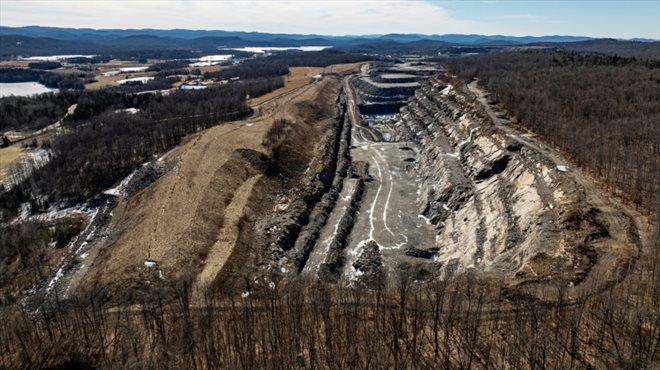Posters reading “St-Élie-de-Caxton, incompatible with mining activity” are installed in several places in St-Élie-de-Caxton, Quebec, Canada on February 20, 2024 (AFP/Genevieve Normand)
Living on land coveted by the mining industry: this is the new reality for many Quebecers. The province, rich in essential minerals, whets appetites but citizens worried about the social and environmental effects are determined to resist.
Because here the subsoil does not belong to the owners of the land, and many have discovered this recently.
In recent months, tens of thousands of soil exploration permits have been issued. In the new global rush for primordial minerals to fuel the “electric” shift in the energy transition, the French-speaking province is a crucial point on the map.
As soon as you enter Saint-Élie-de-Caxton, halfway between Montreal and Quebec, the tone is set: “Saint-Élie, incompatible with mining activity”, “Don’t dig in my Caxton” proclaim many signs installed in this village of 2,000 inhabitants.
“We are at war,” says Gilbert Guérin, spokesperson for the “Don’t Dig in My Caxton” committee, pointing to a multi-colored map detailing the exploration permits called “claims” which divide the village.

Yvan Lafontaine contemplates his vast land, covered by a mining claim, from the top of an observation tower in St-Mathieu-du-Parc, Quebec, Canada on February 20, 2024 (AFP/Genevieve Normand)
In Quebec, it only takes a few clicks and around 75 dollars (50 euros) to become the holder of a mining claim covering up to 100 hectares. And someone on the other side of the world can do it the same way.
“I bought here, I thought I would be sovereign at home, but I understood that the basement did not belong to me,” confides Yvan Lafontaine from the observation tower he had built in the neighboring village. of Saint-Mathieu-du-Parc.
When he learned that a company had acquired the mining titles to the subsoil of his property, his little “paradise”, this great nature lover counterattacked and therefore purchased 12 claims around it.

Mining titles in Quebec (AFP/Corin FAIFE, Jean-Michel CORNU)
Currently, more than 350,000 claims are registered in Quebec, or 10% of the province. Increasingly, the southern regions of the province, where the majority of the population lives, are coveted.
According to an AFP analysis of government data, the number of claims issued has increased significantly over the past year and a half. Thus, from September 2022 to the end of February 2024, around 160,000 titles were granted, an increase of 140% compared to the previous 18 months.
The dream of these new buyers: finding lithium, zinc, graphite, nickel, cobalt…
– “Far west” –
The law on mines is “outdated”, believes Julie Hamelin, who is one of the mobilized residents. “It’s a bit of a Wild West way of buying claims,” she adds, urging the provincial government to protect inhabited lands, and not exploit them.
Comparing Saint-Elie to a “small Gallic village”, Gilbert Guérin, a former civil servant, is concerned about the “irreversible consequences” that a mining project would have, particularly on the region’s groundwater.

Aerial view of the graphite mine belonging to the Northern Graphite company in Lac-des-Îles, Quebec, Canada on March 7, 2024 (AFP/Sebastien ST-JEAN)
So, to resist, the residents in turn spent thousands of dollars to buy more than 220 claims around the village, in order to discourage businesses.
Faced with growing discontent, the Quebec government has announced its intention to modernize its mining law. But he wants to reassure, explaining in an email to AFP “that no exploration can be carried out without the consent of the owner of private land”.
For their part, mining companies continue to point out Quebec’s potential.
“There is a lot of graphite in Quebec. It could be the most important reserve in the world,” Hugues Jacquemin, CEO of Northern Graphite, explains to AFP.
“We absolutely must develop this sector because it is essential for the manufacture of batteries and electric vehicles,” adds the manager, on the Lac-des-Îles site, 260 km north of Montreal.
This is a shift that Quebec “absolutely” must take, particularly to become independent from China, which has until now dominated the strategic minerals market.

Aerial view of the graphite mine belonging to the Northern Graphite company in Lac-des-Îles, Quebec, Canada on March 7, 2024 (AFP/Sebastien ST-JEAN)
The development of the electricity sector is one of the priorities of Quebec and Canada, which boast of being one of the only countries in the world to possess all the minerals necessary for the production of batteries.
But in Saint-Élie-de-Caxton and its surrounding areas, not all citizens agree with these arguments. “I don’t think we should go in this direction,” says Julie Hamelin. “The solution is degrowth by using what we already have.”
© 2024 AFP
Did you like this article ? Share it with your friends using the buttons below.




